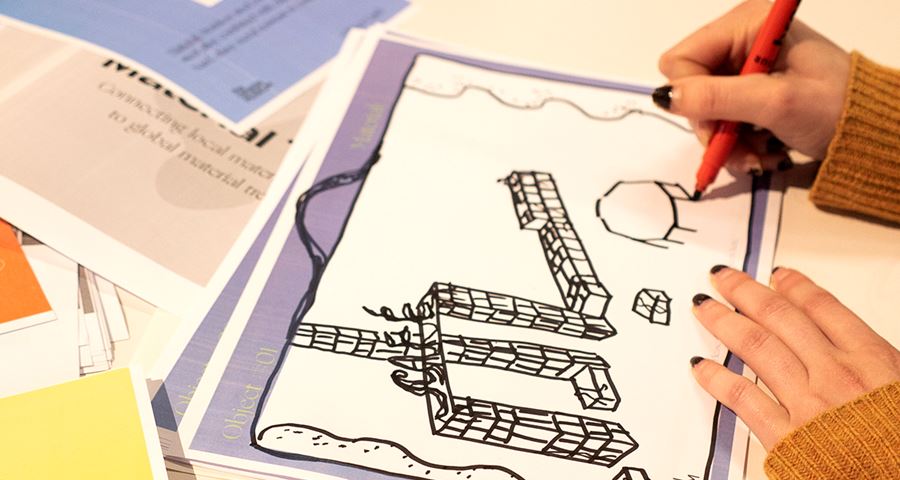Adult Learning Workshop
Material Tales: Research in Action
The 'Material Tales: The Life of Things' touring exhibition unpacks how designed objects and the materials from which they are made impact our day-to-day lives on the one hand and the planet on the other.
This accompanying workshop seeks to understand the material cultures of different regions in more depth, to consolidate ongoing research across the globe into material innovation and sustainable practices.
What to expect
During each workshop, subject specialists from different design disciplines are challenged to respond to emerging and pressing design concerns by exploring the materials that might provide the solution to these issues.
Conducted in different regions, the findings will be shared on this page building up a global virtual materials library outlining material properties and the thematic connotations researchers have identified during the sessions.
The workshop was developed with assistance from Seetal Solanki of Ma-tt-er, who ran a preliminary session encouraging participants from the UK to think about materials on the micro scale to develop their material literacy.
Material literacy was defined as a multisensory understanding of materials, their life cycles, and our roles in their lives as well as vice versa. The remote workshop, delivered in 2021 during the UK’s Winter lockdown, enabled us to start conceiving of materials as other than resources – as part of living systems; as emotional catalysts, and as generous providers.

Embracing a de-anthropocentric approach to materials
Developed in collaboration with Material Futures tutor Marta Giralt, the workshop explored the following macro-themes within material development:
Grown: These are materials which can be naturally or artificially grown. From lab-grown bacterial dyes to self-grown mycelium, this theme highlights the potential of co- designing with nature to substitute materials with a detrimental impact to the planet or find exciting methods of fabrication.
Smart: Technology is redefining our material landscape. Recent developments in synthetic biology, biotechnology and nanotechnology have allowed designers and material innovators to push the boundaries of what our material world has to offer. From high performance graphene textiles to garments that repair our microbiome, the possibilities are endless.
Circular: Creating circular material cycles is key to paving the way to a more sustainable future. Designers across the globe are exploring how to utilise waste streams from a wide range of industries to avoid valuable materials ending up in landfill or being wasted. By understanding the ins and outs of our material cycles waste can become a precious resource.
Regenerative: Looking beyond just ‘being sustainable’, this theme highlights materials that not only sustain the environments they are grown in but also regenerate them. Learning from traditional indigenous practices, these materials give back to the ground and sea they grow in.
Hyperlocal: The effects of globalisation have had a severe impact on local industries and the environment. This theme brings to the forefront how designers are turning to traditional local materials and manufacturing industries to revitalise local economies and cultural identities. By going hyperlocal we not only celebrate the local vernacular but also reduce our carbon footprint.
Co-creation
Within each workshop, there is scope for participants to identify a missing theme that is pertinent to their region. Participants are then invited to explore materials that they feel define those themes, by exploring the values we attach to those materials and testing them out in imaginary prototypes.
As the workshop travels the world alongside the Material Tales exhibition, its findings will be documented here. Participants will contribute to research by identifying the most innovative material developments in their area as well as how these materials can revolutionise iconic designs.
Research in Action Workshop – London
The Research in Action workshop was first delivered at the Design Museum in November 2021 by Marta Giralt. The workshop was conducted through a 3 stage process of activities – define, refine and redesign.
Get in touch
For more information on this workshop, please contact the team via touring@designmuseum.org